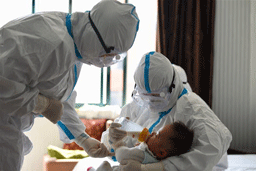Goa is abuzz with excitement as vintage bike and car owners, users, collectors and fans are decking […]

INFLAMMATION SYMPTOMS OF COVID-19 IN KIDS!
In the News, May 29- June 4 2021 May 28, 2021IMMUNITY: Contrary to earlier belief children below 10 years can also be infected by the coronavirus. However, because of their stronger immunity the infection is usually mild to moderate
By Dr Supratim Sen
Amongst the symptoms of covid-19 in children below the age of 10 is multiple inflammation of various organs of the body. Children below 12 years have a much stronger immunity system and have so far not been infected on a large scale. However, even in the case of Goa, the Directorate of Health Service Dr Jose D’Souza has revealed that there have been 16,000 cases of infection in kids below 16 years since the beginning of covid-19
What parents and caregivers need to know….offers insight into multisystem inflammatory syndrome seen in the second wave of covid affecting children in Mumbai and elsewhere.
WHAT is MIS-C?
It is multisystem inflammatory syndrome in children which is temporarily associated with SARS-CoV-2. It is also called PIMS. It is a hyper inflammatory syndrome occurring soon after children are infected with covid virus. The first cases of this condition were reported last year between March and May, 2020 .
However, please note that children with covid infections may develop MIS-C. MIS-C is a relatively rare complication of covid infection in children, seen in <1 % of children with confirmed infection. Usually, MIS-C can occur 4-8 weeks after the primary covid infection.
How do we suspect MIS-C? What are the symptoms?
Patients with MIS-C present with high grade fever, skin rashes, redness of eyes, changes in their lips and tongue, diarrhoea, vomiting and enlargement of lymph nodes. MIS-C can involve the heart in around 30-40% of patients and cause decreased pumping function of the heart muscle sometimes along with dilation of the coronary arteries, which are the blood vessels supplying blood and oxygen to the heart. If the heart muscle becomes weak, the patient develops low blood pressure and shock. This manifests as excessive tiredness, extreme lethargy and breathing difficulty.
How are the symptoms of MIS-C different from primary COVID infections?
There is an overlap of symptoms between the two conditions. Fever occurs in both. Primary covid usually has lung involvement which can manifest as cough and breathlessness. MIS-C has predominant mucocutaneous features, that is, skin rashes, conjunctivitis and mucosal changes in the mouth and tongue.
How is MIS-C diagnosed?
Is there a confirmatory test? MIS-C is a clinical diagnosis, which should be considered in children with persistent high-grade fevers, more so if there is an associated skin rash or conjunctivitis, and especially if the child has had recent covid infection or exposure.
MIS-C patients will be positive for covid antibodies on testing. In addition, blood inflammatory markers such as CRP, procalcitonin, D-dimer, serum Ferritin and IL-6 may be elevated. Coagulation parameters such as PT and APTT may be deranged. A cardiac echocardiogram is confirmatory if decreased cardiac function and/or dilated coronary arteries are detected.
Should all patients diagnosed with MIS-C be admitted in ICU? What is the treatment of MIS-C?
No, the decision regarding hospital admission and ICU admission depends on the symptoms of the patient and should be taken by the treating pediatrician. Doctors are now well-aware of MIS-C, and treatment protocols are also well researched and standardized.
Sick patients with MIS-C who present with shock do need ICU admission and special medicines to support the heart and blood pressure. The specific treatment for the multisystemic inflammation is by intravenous steroids and/or intravenous Immunoglobulin, both of which are given as injections. Patients who have cardiac involvement at initial presentation are continued on Aspirin for a few weeks.
What is the long-term outcome of MIS-C? Are there any long-term cardiac sequelae?
If diagnosed early and treated well, MIS-C has a good long-term outcome. Cardiac involvement recovers completely in most patients within a few weeks of recovery.
Is MIS-C contagious? Can a patient with MIS-C pass on the condition or COVID infection to another child?
No. A patient who has recovered from primary covid and develops MIS-C, in whom repeat COVID RT-PCR is negative, is not contagious.
How frequently do we see MIS-C cases in Mumbai? Is symptomatic MIS-C more or less frequent than primary covid in children? Is there any difference in the first and second covid wave with regards to MIS-C?
Last year, we saw many MIS-C patients in Mumbai between July and September, which was consistent with the temporal association of MIS-C occurring a few weeks after a covid wave in a population.
In the second wave, we are seeing a greater number of primary covid in children presenting with lung involvement, respiratory manifestations and requiring ICU admission. Concurrently, now that we are a few weeks into our second wave in Mumbai, we are gradually seeing an increasing trend in MIS-C patients. As the covid numbers in this second wave are more, with more children being affected compared to last year, we are seeing more MIS-C patients and the numbers may go up further in the coming weeks.
What follow-up is required for the patient after recovering from MIS-C?
Generally, we repeat a cardiac echocardiogram after 1-2 weeks and again after 4-6 weeks. Aspirin, if it has been started for cardiac involvement, is continued for a few weeks depending on the follow-up echocardiogram findings.
Should parents and caregivers be worried about MIS-C?
Firstly, both pediatric covid and MIS-C have excellent outcomes when diagnosed and treated in a timely manner. Hence, there is no need to panic about this condition. Of course, any child who has a persistent high-grade fever should be assessed by a pediatrician so the appropriate diagnostic evaluation and treatment can be started in a timely manner.
(Dr Supratim Sen is a senior consultant pediatric cardiologist, SRCC Children’s Hospital, Mumbai.)














